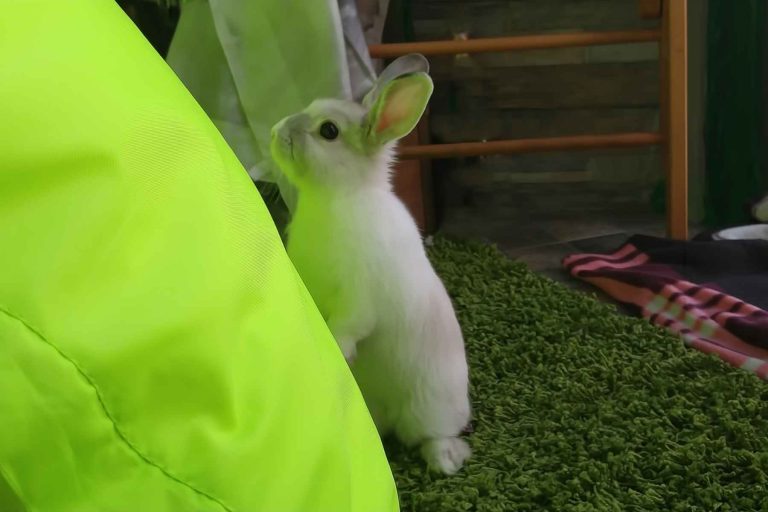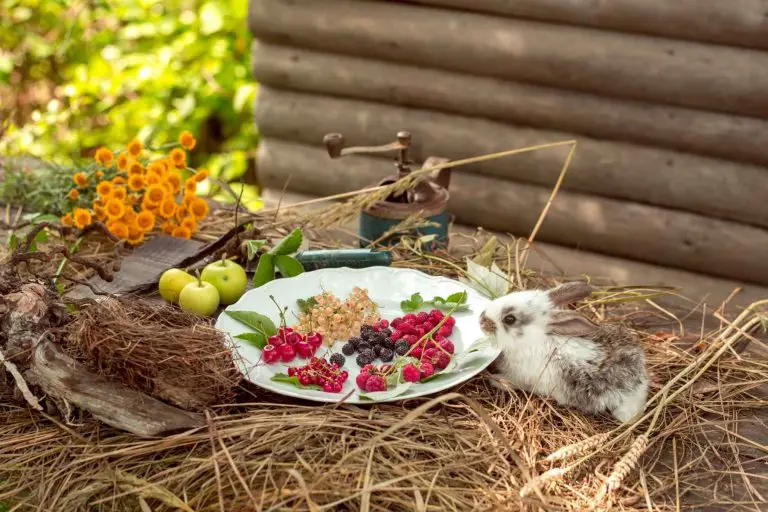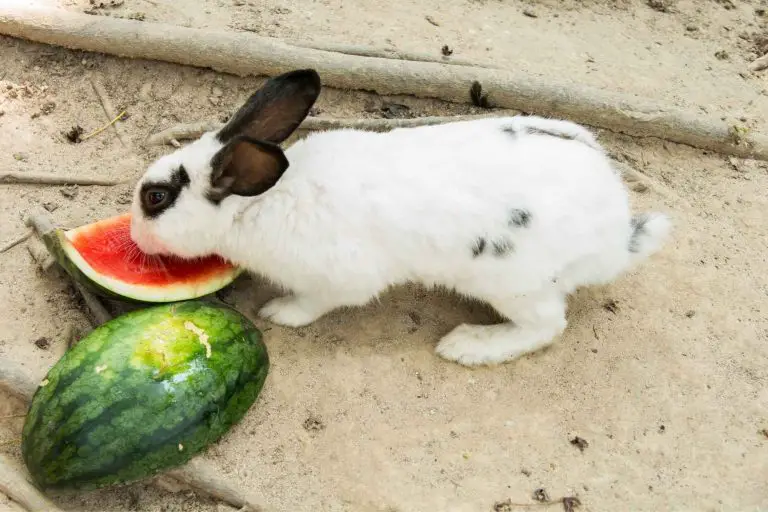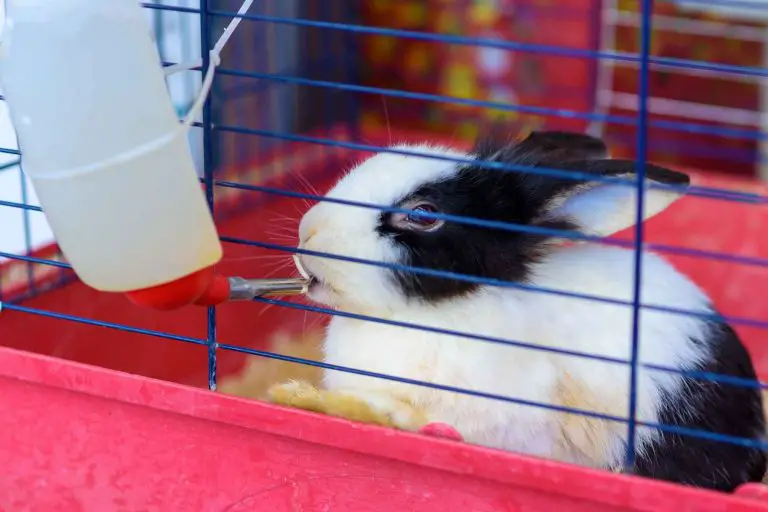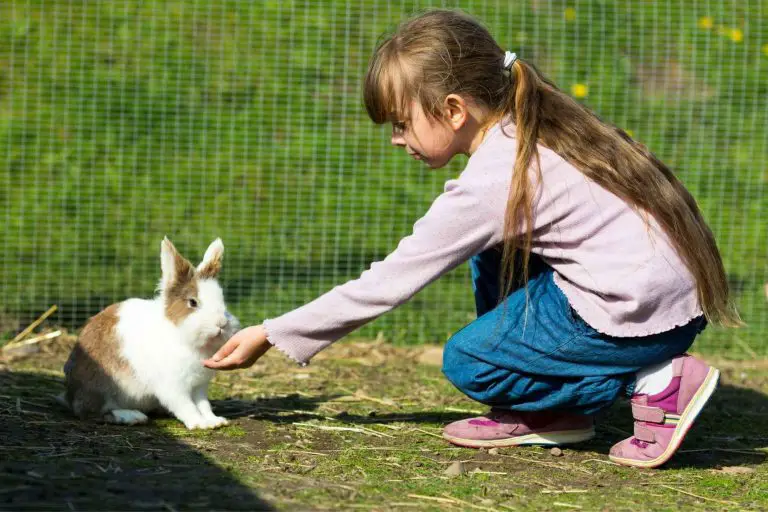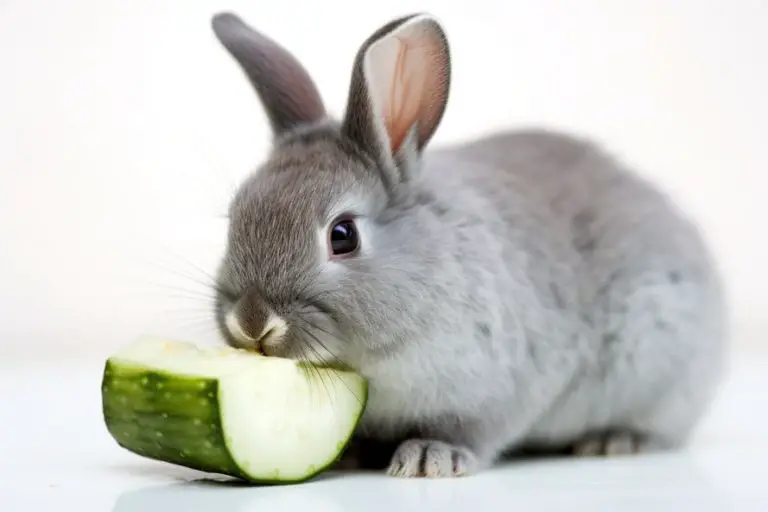Can Rabbits Eat Strawberries? (A Quick Guide)
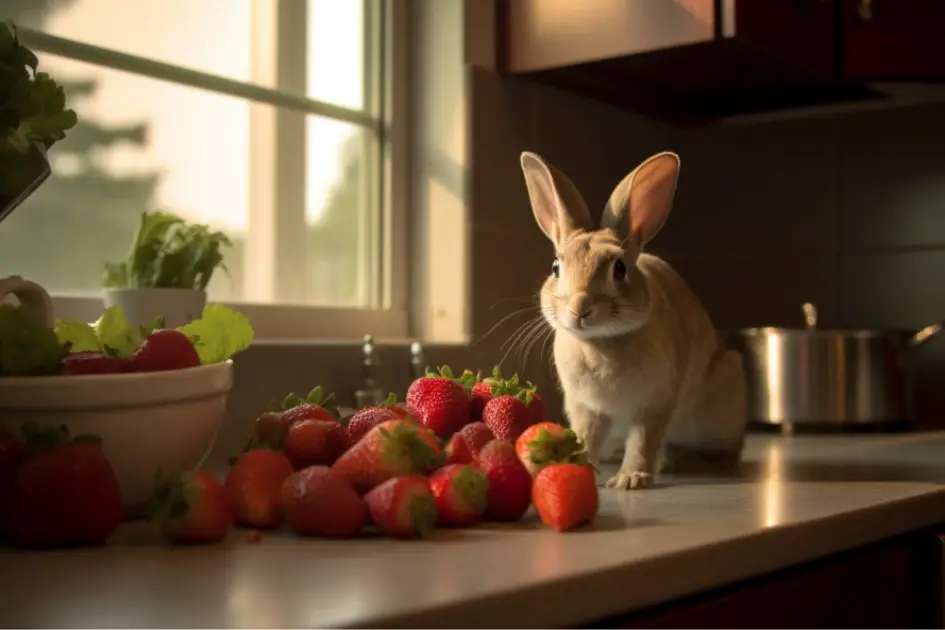
When it comes to feeding rabbits, many pet owners wonder what types of fruits and treats are safe for their furry friends. One common question is whether rabbits can eat strawberries. As herbivores, rabbits have specific dietary needs that must be met for them to thrive and maintain good health.
Strawberries, being a popular and tasty fruit choice, can indeed be a part of a rabbit’s diet, but with certain limitations. These fruits contain essential nutrients and vitamins, such as vitamin C, which can benefit rabbits. However, due to their high sugar content, strawberries should only be offered to rabbits as an occasional treat, in moderation.
Aside from their sugar content, there are a few other considerations pet owners should take into account before offering strawberries to their rabbits. Understanding the appropriate amount and frequency to feed this fruit, as well as how to properly prepare them, is essential to ensure the rabbit’s health and happiness.
Can Rabbits Eat Strawberries
Rabbits can indeed eat strawberries, but it is essential to feed them this fruity treat in moderation. Strawberries are high in natural sugars, which could be harmful to a rabbit’s digestive system if consumed in excessive quantities.
It’s also important to consider the size of the strawberry portion given to the rabbit. A small slice or half of a strawberry is an appropriate serving size for an adult rabbit. Juvenile rabbits should be introduced to strawberries carefully and in smaller quantities to monitor their digestive reactions.
When feeding strawberries to rabbits, it is necessary to wash the fruit thoroughly to remove any traces of pesticides or chemicals. Additionally, the green leafy top of the strawberry should be removed as it can be difficult for rabbits to digest. Here are some key points to consider when feeding strawberries to rabbits:
- Feed in moderation due to high sugar content
- Provide an appropriate serving size based on the rabbit’s age and size
- Wash thoroughly to remove any chemicals or pesticides
- Remove the green leafy top before serving
Though strawberries can be a delicious treat for rabbits, prioritizing a diet rich in hay, leafy greens, and a small number of pellets is imperative to maintain their overall health and well-being.
Health Benefits of Strawberries for Rabbits
Strawberries provide several health benefits for rabbits, including essential vitamins and minerals, fiber, and antioxidants. This section will explore these nutritional aspects and how they contribute to a rabbit’s well-being.
Vitamins and Minerals
Strawberries are rich in various vitamins and minerals that are beneficial for rabbits. These include:
- Vitamin C: Helps in maintaining a healthy immune system and promoting overall wellness.
- Potassium: Supports muscle function, nerve signaling, and fluid balance.
- Magnesium: Essential for bone health and energy production.
Feeding your rabbit strawberries in moderation can help ensure they receive these essential nutrients, contributing to their overall health.
Fiber
Strawberries contain a moderate amount of fiber, which is crucial for maintaining a healthy digestion system for rabbits. Fiber helps to:
- Regulate bowel movements
- Prevent gastrointestinal issues
- Promote a healthy gut flora
Keeping a rabbit’s digestive system in good condition is vital for their well-being, and including fiber-rich treats like strawberries can contribute to this objective.
Antioxidants
Strawberries are also a natural source of antioxidants, which can offer several health benefits to rabbits, such as:
- Protecting cells from damage caused by free radicals
- Reducing inflammation
- Supporting a healthy immune system
By providing antioxidants through foods like strawberries, rabbits can benefit from these positive effects and maintain their overall health.
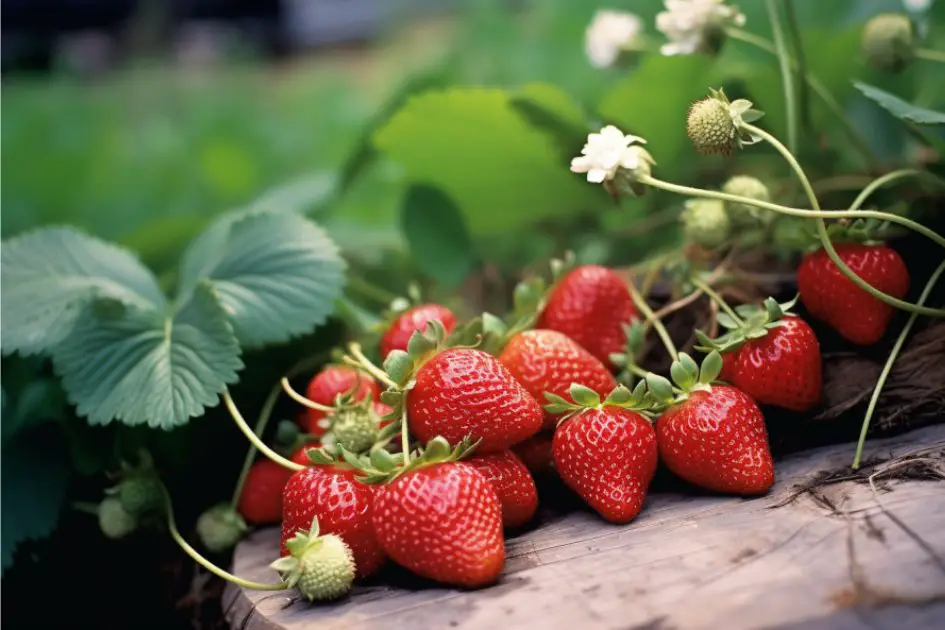
Potential Risks of Feeding Strawberries to Rabbits
Sugar Content
Strawberries, like most fruits, contain sugar. While rabbits can enjoy the occasional treat, a high sugar content can lead to health issues. Regular consumption of sugar can cause digestive problems, including diarrhea, and may even lead to tooth decay.
Pesticides and Chemicals
Strawberries are sometimes exposed to pesticides and chemicals during cultivation. Feeding your rabbit strawberries without properly washing them can potentially introduce harmful substances into their system.
It is essential to thoroughly wash all fruits and vegetables, including strawberries, before providing them to your rabbit. When possible, choose organic options to minimize the risk of toxic exposure.
Overfeeding and Obesity
Rabbits have small stomachs, and feeding them too many strawberries in one sitting can lead to overfeeding. Consuming excessive amounts of any food may result in obesity, which is detrimental to the overall health and wellbeing of your rabbit.
Restrict the intake of strawberries to small portions as an occasional treat, ensuring that the main staple of their diet remains fresh hay, vegetables, and water.
It is crucial to be mindful of these potential risks when offering strawberries as a treat to rabbits, always prioritizing their long-term health and wellbeing.
Feeding Guidelines for Strawberries
Rabbits can enjoy strawberries as a treat, but it is important to follow certain guidelines to ensure their health and safety. This section will cover the frequency and quantity, preparing and serving strawberries, and alternatives to strawberries for your rabbit’s diet.
Frequency and Quantity
When feeding strawberries to rabbits, moderation is key. These fruits should not be a staple in their diet, but rather an occasional treat. Ideally, rabbits should be given strawberries no more than once or twice a week. The quantity should be limited to one or two small, bite-sized pieces each time, depending on the size of your rabbit.
Preparing and Serving Strawberries
Before serving strawberries to your rabbit, make sure to thoroughly wash the fruit under running water to remove any dirt, pesticides, or other contaminants. If possible, choose organic strawberries to minimize the risk of harmful chemicals.
Additionally, it’s recommended to remove the green leafy top and any seeds, as they can pose a choking hazard or cause digestive issues in rabbits. Once the strawberry has been properly cleaned and prepared, cut it into small, bite-sized pieces that are easy for your rabbit to chew and swallow.
Alternatives to Strawberries
While strawberries can be an enjoyable treat for rabbits, there are many other fruits and vegetables that can be incorporated into their diet as well. Variety is important to provide rabbits with essential nutrients and prevent boredom. Some healthy alternatives to strawberries include:
- Apple (without seeds)
- Pear (without seeds)
- Blueberries
- Raspberries
- Bell pepper
Remember, it’s crucial to introduce new foods to your rabbit’s diet gradually to avoid upsetting their digestive system. Monitor your rabbit closely for any adverse reactions and consult your veterinarian if you have any concerns.
Strawberry Parts and Varieties for Rabbits
Leaves, Stems, and Seeds
Rabbits can safely consume the leaves and stems, as they contain essential nutrients and pose no harm to their health. However, it’s important to only offer fresh, pesticide-free leaves to avoid potential health risks. Strawberry seeds are typically harmless, but it’s better to limit their intake as they can be difficult for rabbits to digest.
Dried, Frozen, and Cooked Strawberries
Rabbits should always be served fresh fruits, so it is not recommended to offer them dried or frozen strawberries. Dried strawberries usually contain added sugar, which can cause an upset stomach for your rabbit. Likewise, frozen strawberries can cause digestive issues due to their temperature and texture.
Cooked strawberries are also unsuitable for rabbits, as cooking the fruit alters its nutritional content and can make it harder for rabbits to digest. Always choose fresh strawberries for your rabbit’s fruit snack.
Strawberry Jam and Other Products
Rabbits should never be fed strawberry jam or any kind of strawberry-flavored product due to the high sugar content, preservatives, and artificial ingredients that may be harmful to their health. It’s essential to keep their diet as natural and healthy as possible.
In summary, when offering strawberries to rabbits, it’s best to provide fresh strawberries in moderation, considering that leaves and stems can also be safely consumed. Avoid giving them dried, frozen, or cooked strawberries and any strawberry-based products.
Other Food Options for a Healthy Rabbit Diet
Rabbits are herbivores, which means their primary food source consists of plants. A healthy and balanced diet for pet rabbits can ensure the long-term health and wellbeing of these furry friends. This section will cover some of the essential food components for a healthy diet, including hay and grass, vegetables and leafy greens, as well as pellets and treats.
Hay and Grass
Hays and grasses should make up the majority of a rabbit’s diet as they are an indispensable source of fiber. They promote proper digestion and help to wear down rabbit’s teeth, which grow continuously. Some recommended types of hay for rabbits include:
- Timothy hay
- Orchard grass
- Oat hay
- Meadow hay
Baby rabbits, however, should be provided with alfalfa hay because it contains a higher level of calcium and protein that supports their rapid growth.
Vegetables and Leafy Greens
Vegetables and leafy greens are essential for providing rabbits with a variety of nutrients and vitamins. They should be introduced gradually to a rabbit’s diet and offered in moderation. Some suitable vegetables and leafy greens for rabbits include:
| Vegetables | Leafy Greens |
| Carrots | Romaine lettuce |
| Broccoli | Kale |
| Bell peppers | Collard greens |
| Zucchini | Swiss chard |
Pellets and Treats
Pellets should make up a smaller portion of a rabbit’s diet, offering additional nutrients and vitamins. Look for high-quality pellets made primarily from hay and avoid those with added sugar or seeds. Adult rabbits should consume around 1/4 cup of pellets per 5 pounds of body weight daily.
Treats can be given occasionally and in moderation to pet rabbits. While fresh fruit, such as strawberries, can serve as a treat, other approved treats for rabbits are:
- Sliced apples
- Bananas
- Raspberries
- Blueberries
It is vital to keep the portions small and monitor rabbit health regularly.
Conclusion
In summary, rabbits can safely consume strawberries as an occasional treat. However, it is essential to limit their intake because strawberries are high in sugar content, which can lead to health issues if consumed excessively.
When introducing strawberries to a rabbit’s diet, start with small amounts and monitor their reaction. If the rabbit shows no negative symptoms, gradually increase the serving size while still considering moderation. It is ideal to wash strawberries thoroughly and remove any leaves or stems before feeding them.
Incorporating a variety of fresh vegetables, hay, and water into a rabbit’s daily diet is vital for overall health and wellbeing. While strawberries can be a tasty treat, they should never replace these essential dietary components.

